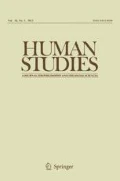References
Button, G., and Casey, N. (1984). Generating topic: The use of topic initial elicitors. In J.M. Atkinson and J. Heritage (Eds.), Structures of social action: Studies in conversational analysis. Cambridge: Cambridge University Press.
Coulmas, F., Ed. (1981). Conversational routine: Explorations in standardized communication situations and prepatterned speech. The Hague: Mouton.
Friedman, E. (1979). The telephone book. New York: Power Mad Press.
Garfinkel, H. (1967). Studies in ethnomethodology. Englewood Cliffs, N.J.: Prentice-Hall.
Godard, D. (1977). Same setting, different norms: Phone call beginnings in France and the United States. Language in Society 6: 209–219.
Goffman, E. (1963). Behavior in public places. New York: Free Press.
Goffman, E. (1971). Relations in public. New York: Basic Books.
Irvine, J.T. (1974). Strategies of status manipulation in the Wolof greeting. In R. Bauman and J. Sherzer (Eds.), Explorations in the ethnography of speaking. Cambridge: Cambridge University Press.
Jefferson, G. (1980). On ‘trouble-premonitory’ response to inquiry. Sociological Inquiry 50: 153–185.
Maynard, D. (1984). Inside plea bargaining. New York: Plenum Press.
Sacks, H. (1968). Unpublished lecture, 8 May 1968.
Sacks, H. (1970). Unpublished lecture, 23 January 1970.
Sacks, H. (1975). Everyone has to lie. In B. Blountand M. Sanches (Eds.), Sociocultural dimensions of language use. New York: Academic Press.
Sacks, H. (1984). On doing ‘being ordinary.’ In J.M. Atkinson and J. Heritage (Eds.), Structure of social action: Studies in conversational analysis. Cambridge: Cambridge University Press.
Schank, R.C., and Abelson, R.P. (1977). Scripts, plans, goals, and understanding: An inquiry into human knowledge structures. Hillsdale, N.J.: L. Erlbaum Associates.
Schegloff, E.A. (1967). Unpublished dissertation. Department of Sociology, University of California at Berkeley.
Schegloff, E.A. (1968). Sequencing in conversational openings. American Anthropologist 70: 1075–1095.
Schegloff, E.A. (1970). The social organization of conversational openings. Unpublished ms.
Schegloff, E.A. (1979). Identification and recognition in telephone conversation openings. In G. Psathas (Ed.), Everyday language: Studies in ethnomethodology. New York: Irvington.
Schegloff, E.A. (1980). Preliminaries to preliminaries: “Can I ask you a question?’ Sociological Inquiry 50: 104–152.
Schegloff, E.A., Jefferson, G. and Sacks, H. (1977). The preference for self-correction in the organization of repair in conversation. Language 53: 361–382.
Schmidt, R.W. (1975). Sociolinguistic rules and foreign language teaching. Paper presented at the Symposium on Sociolinguistics and Applied Anthropology. Annual meeting of the Society for Applied Anthropology, Amsterdam.
Wolfson, N. (1983). Rules of speaking. In J.C. Richards and R. W. Schmidt (Eds.), Language and communication. New York: Longman.
Author information
Authors and Affiliations
Additional information
Parts of the work presented here were developed in course lectures at Columbia University in the late 1960s and through 1972, at the Linguistic Institute, University of Michigan, Summer 1973, and at UCLA, 1972–1975. A more formal presentation of an earlier version was made at a pre-session of the World Congress of Anthropology, Chicago, 1973. The material was organized with the present theme for presentation to a Conference on Improvisation, organized by the Center for Music Experimentation, University of California, San Diego, in May 1983. Especially during the earlier period of work on these materials (1966–1973) I had many exchanges about them and about the issues they involved with Harvey Sacks, the product of which will be clearly discernable to those who are familiar with Sacks' lectures, especially those for Winter 1970.
My thanks to Jennifer Mandelbaum for helping to clarify obscurities in the text, and to Elinor Ochs for a sympathetic reading and suggestions.
Rights and permissions
About this article
Cite this article
Schegloff, E.A. The routine as achievement. Hum Stud 9, 111–151 (1986). https://doi.org/10.1007/BF00148124
Issue Date:
DOI: https://doi.org/10.1007/BF00148124

